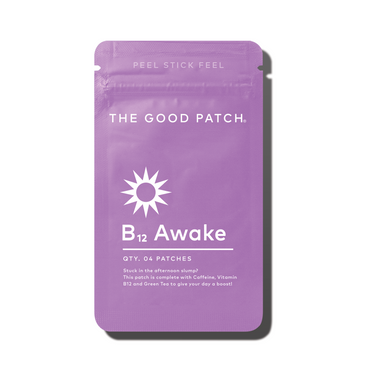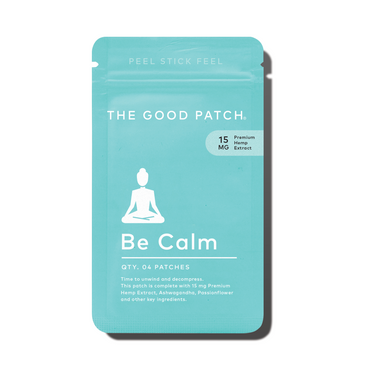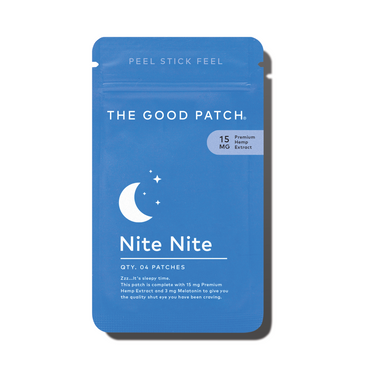Restful sleep is one of the best forms of self-care, so why not set yourself up for success? At The Good Patch, we know what it’s like to struggle to fall asleep, which is why we’ve come up with a useful list of easy bedtime routine ideas (and some handy patches, like the Dream Patch, to offer a little extra support).
Everyone’s routine will look different depending on our unique needs and interests, but having a routine can push us closer to the quality of sleep we’re looking for. Whether stress and anxiety keep you up or you just can’t seem to get tired, having specific habits to follow will help train your body to expect sleep when you want it to.
Follow along with us to see which sleep habits suit you best!
Getting Ready for Tomorrow
Put Yourself Ahead in the Morning
Waking up can be a struggle, so don’t give yourself more work than you need to!
Using the time before bed to prepare for the next day can make all the difference for a more relaxed evening and morning. You’ll get into bed more relaxed and avoid lying there thinking of everything you need to get done tomorrow. Plus, not having to wash dishes or stress over an outfit in the morning gives you time to chill out and mentally ready yourself for the day.
Here are a few tips for lessening stress as you fall asleep and wake up:
- Collect your necessities, like wallet, keys, bag, and so on, so you aren’t running around frantically searching
- Wash up the dishes
- Decide what you’ll wear the next day
- Prep lunch for school or work
Even taking 20 minutes each night to plan for tomorrow can bring much-needed calm as you fall asleep.
Create a Physical To-Do List
We all have experienced the frustration of lying awake as we stress over tomorrow’s problems.
Relieve your mind from the temptation of running through everything you have to in the day to come by converting your mental to-do list to a written one.
For some, scheduling your whole agenda will be helpful, while others may prefer to put down the big things. Whatever works best for you, sometimes making a physical list can literally and figuratively get it out of your mind.
How To Unwind
Start Journaling
Similarly to the to-do list, journaling is a great way to free up space in your head and push out thoughts that bring up anxiety and block your path to better sleep.
Set aside just a few minutes each night to reflect, express gratitude, and write about anything else on your mind. If writing isn’t your favorite pastime, drawing can be just as good an outlet.
Above all, don’t overthink it! The purpose of journaling at bedtime is to relieve stress. When you inevitably forget to journal or simply can’t find the motivation, that’s okay. Be gentle with yourself and get back to it when you’re ready.
Stay Away from Intense Exercise
Working out has wonderful physical and mental health benefits and can even help you get quality sleep. However, exercise just before bed is shown to release endorphins which increase activity in the brain and may make it more difficult to fall asleep.
Intense exercise also increases your heart rate and body temperature, which may add to the struggle. It’s a good idea to stay away from exercise at the end of the day to avoid negative effects on sleep, but we know that’s the only time some of us have.
If exercise must be part of your nighttime routine, try to leave at least an hour before bed and consider one of the following exercises:
- Yoga
- Stretching
- Walking
- Slow cycling
Try a warm bath if you’re not the exercise type or want to replace exercise with something more restful before bed. You can read a book or just reflect on your day while you soak in the suds — and, most importantly, your muscles will begin to relax and get you ready for bed.
Practice Meditation and Mindfulness
Find peace of mind with your bedtime routine by engaging in mindful activities. Mindfulness can have a different definition for everyone, but in general, it is a purposeful attentiveness to yourself and your environment.
You might have heard of one of the most popular forms of mindfulness — meditation! Though meditating can be intimidating to those of us who’ve never given it a shot before, it’s easier than it seems and super rewarding.
The practice of meditation helps to relax you both mentally and physically. Three minutes of deep breathing and letting go of self-criticism may be all you need to hop into bed calmer than ever. For an added bonus, light a candle or start your essential oil diffuser for relaxing aromatherapy.
Listen to a Calming Playlist
Music is the perfect accompaniment for all different parts of life. Many of us enjoy pump-up music before the gym or an important presentation, but it can also play a role in helping us wind down at bedtime.
Studies suggest that music has real effects on our mood and well-being. While we all like different types of music, heavy EDM probably isn’t the best choice for pre-sleep listening. Aim for slow instrumental music for maximum relaxation!
Take a Technology Timeout
Sometimes all we want to do at the end of a long day is scroll aimlessly on social media or binge our favorite TV series. Unfortunately, technology has certain negative effects on our bodies and minds, making it harder to sleep.
Exposing yourself to the blue light screens give off can throw off your circadian rhythm by tricking your body into thinking it’s still daytime. The stimulation of technology can also keep your brain more active than it should be.
Here are some good alternative forms of evening entertainment:
- Reading a book or poetry
- Painting and drawing
- Working on a puzzle
- Playing cards or board games
Find Family (or Friend) Time
Creating a routine with loved ones around bedtime will increase bonding and boost your own mood. Going to sleep happy and feeling loved is a certain way to fend off any pesky stressors.
Of course, we all have different living situations, so this could be a moment to take with whoever is around to connect with. These connections may be partners, children, roommates, or even pets!
Make a good chat, bedtime story, or snuggle before bed part of your consistent nightly routine.
Set the Scene
Keep the Lights Low
Warmer and dimmer lights are ideal for signaling to your brain that it is almost time to get some rest.
As we discussed, our brains use light to determine their circadian rhythm or biological clock. After the sun sets, your body knows to release the hormone melatonin to make you feel tired. Bright, harsh light can disrupt your natural sleep patterns, so try switching from the overheard to a table lamp in the evening.
Check the Temperature
Do you constantly toss and turn in an overly hot room at night? You might need to turn down the temp just a bit.
The recommended temperature for sleeping is actually between 60 and 67 degrees Fahrenheit. This might seem brisk, but our bodies get significantly warmer as we sleep, so keeping your bedroom cool can keep you from overheating in the middle of the night.
Embrace the Wakefulness
The last, but perhaps most important piece of advice we can give you is to accept when you just can’t seem to fall asleep. It won’t do you any good to get frustrated with yourself when you are struggling.
Instead, try giving yourself affirmations that you will soon fall asleep. If you still can’t get to sleep after 20 minutes or so, change the scene. Read a book or sip chamomile tea in a cozy spot of your home until you start to feel tired.
Conclusion
Regardless of what you end up doing, sticking to your bedtime rituals will quickly lead to a healthy sleep routine that will leave you well-rested and ready to go head-to-head with the day!
If you need a little more assistance, we’re here to help! Come stop by The Good Patch to see what we’ve got going on in the sleep department. Our Nite Nite patch is specially made to give you the support you need for a good night’s sleep.
Sources:
The benefits of napping | Harvard Health
Exercising for Better Sleep | Johns Hopkins Medicine
Mindfulness Definition | What Is Mindfulness
Music and mood regulation during the early stages of the COVID-19 pandemic
Circadian Rhythms | National Institute of Health
Effects of thermal environment on sleep and circadian rhythm | Journal of Physiological Anthropology







